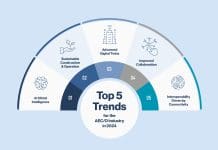Property industry experts have called for the government to prioritise data standardisation, collaboration and community engagement in planning system reforms
Leading figures from across the property industry discussed the key priorities that must be considered as part of the proposed reforms of England’s planning system during a virtual event that focused on the government’s ‘Planning for the Future’ consultation.
Representatives, including those from MHCLG, Atkins, RICS, ABI and BRE, welcomed the focus on taking an ‘analogue’ service to ‘digital’, to provide greater collaboration, standardisation of processes, digitisation of data to support plan-making and community engagement in planning applications and decisions across the country.
The event, chaired by Alex Wrottesley, managing director of Landmark Information’s Environment & Mapping division, brought together industry leaders to debate the details of the Planning for the Future consultation whitepaper ahead of the submission deadline on 29 October.
‘From analogue to digital’
Talking at the event, Paul Maltby, chief digital officer of the MHCLG, said: “The whitepaper sets out some quite radical changes to the planning system for England.
“There’s much around policy changes, design, technology, digital services and data – however we see technology and data is really at the heart of this.
“There are four main areas where we see data and digital services having a big change. The first is community engagement; enabling people to become more involved in the decision-making process for our towns through digital services, which will make this more engaging.
“The second is Local Plans; these set the rules for what will happen however finding and interpreting the rules can be hard.
“The third aspect is in Plan Making and planning decisions; this is the case management of plans and how the overall process is managed.
“Currently people struggle with a system of uncertainty of extracting data.
“Finally, PropTech; the UK’s position in a global PropTech market is fascinating and we see this as an important part in fuelling the change in our market.
“The focus is to switch [the planning system] from analogue to digital – with machine-readable formats that include geospatial boundaries; essentially changing documents and words into data and code.
“We don’t see the role of Government as building lots of services but instead as a platform, where trusted, authoritative data is made available for industry to build information or digital services.
“Currently, around 50% of household applications are submitted with errors and planning officers have to spend their time responding to correct submissions. We feel this is a system that can be fixed.”
‘Greater digitisation of spatial planning and plan making’
Helen Dias, technical director of strategic planning at Atkins, added: “Many Local Authorities are still struggling with technology and are reliant on legacy software and paper documents – not data.
“The whitepaper sets out some key issues, including a better use of data and IT; there needs to be greater digitisation of spatial planning and plan making as well as the applications process.
“There needs to be data-rich planning application registers so information can be more easily found, and the data that supports the Local Plan and the process itself must be standardised and more accessible.
“There is a real, real need for the government to put its money where its mouth is and put some real investment into funding local authorities to ensure they have the skills – and resources – in digital planning and urban design, if the aspirations of the Planning White Paper are to be met.”
Commenting on the event, Alex Wrottesley, said: “Collaboration is fundamental to how we do things in a data economy and it’s exciting to see MHCLG and government look at how we create the environment for that collaboration to take place effectively.
“We are preparing a formal response to the consultation and urge the wider industry to do the same.
“It’s so important to be involved in this conversation about how the proposed changes will impact us and our clients and colleagues across the industry.
“Data and PropTech are at the heart of these reforms; by working in collaboration we will modernise and streamline the process so we can build the homes we need, where we need them, and of the quality that is needed, whilst considering the environment around us.”
You can watch a recording of the event here.
















